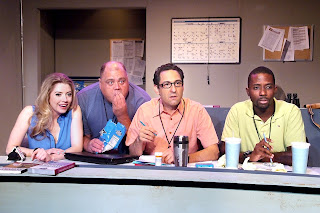This is a story of development hell, network interference, a flawed premise, total absurdity, and how different things were in 1980.
The pilot we pitched and sold was centered around the White House press corps. This seemed an interesting area to us – the notion of people working closely together who were close friends but also rivals. We imagined a plethora of stories of reporters roaming the White House corridors, making friends with White House gardeners and maids, trying to out-scoop each other. We could have romantic rivals, eccentric grizzled reporters, eager newbies, etc.
We could also create this world of the administration. WEST WING long before WEST WING.
And we could include political humor, something that was non-existent in sitcoms at the time.
So the show would be edgy, smart, satiric, very contemporary.
That was our pitch and that’s what ABC loved and bought.
We went off to do research. Thanks to a friend who was a White House correspondent, we got temporary press credentials to join the corps.
What we learned was this: the reporters had NO access to the corridors of the White House. They could NOT just roam the hallways. They all had to stay together as one pack in the pressroom. All day long they just sat. They all got the same presidential itineraries, all received the same briefings. If there was a photo op they were all herded as one into the Oval Office, behind ropes, then told to return to their pressroom. Interaction with the President had to be formally requested and granted. You couldn't just happen to be next to him at the urinals.
When the president traveled so did the corps., but as one group. They flew together, were bussed together, and basically did exactly what they did at the White House – sit around and kill time. Wow!!!
This was maybe the least dynamic character comedy premise EVER. But that part wasn’t ABC’s fault; it was ours for pitching this idea without knowing what the hell we were talking about.
Still, we figured we could save it. Create fascinating characters and watch them interact with each other. Good series are ultimately about relationships anyway.
Originally, we planned to have two young reporters who had a love/hate relationship. We changed that and made the woman the press secretary and the guy a brash new reporter who just got the White House beat. And they had once had a thing together that ended badly. Now you had the fun of the reporter needing this person who he had previously dumped. And there was still a little spark for both of them. There was mileage in that. (Here’s how long ago this was: our prototype for the young guy in our pilot was David Letterman.)
So we had interesting characters and we still had the unique arena of national politics.
Here’s where ABC stepped in. We were not allowed to be specific regarding the president. We couldn’t say whether he was a Republican or Democrat. Well, this was sort of a problem. How could we give him a point of view? Sorry. No party affiliation.
We also couldn’t give the president a NAME. Not even a fictitious one. We couldn’t call him President Smith. They thought even a name was too political.
We weren’t allowed to debate issues. So what was anybody going to talk about? Does anyone know a good barber?
Imagine a lawyer show where no one was allowed to mention the law. It was madness! ABC was concerned our show would be too controversial. President SMITH was too controversial?
Why the fuck did they buy this???
It gets worse.
Our pilot story revolved around one reporter getting to do a one-on-one interview with the president. Which reporter will it be? We decided to go with this story because, well… it’s the ONLY story this premise allowed for.
The last scene was our brash reporter interviewing the president. We artfully avoided issue questions. Note from ABC: We are not allowed to SHOW the president. We can hear him voice over, but actually seeing him is too specific.
We dutifully turned in the second draft -- which ultimately was 45 pages of absolutely nothing -- and to our great relief, it was STILL too incendiary. ABC passed. Shucks! Today we’d be able to say we once did a David Letterman failed pilot. Unless they said we couldn’t actually show the reporter, which in retrospect, was highly likely.
But ABC did say they loved working with us and implored us to bring our next idea to them first. Would it surprise you to learn we didn’t?












































